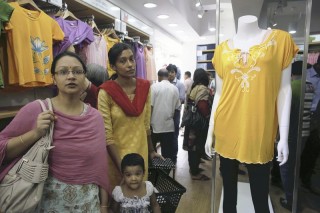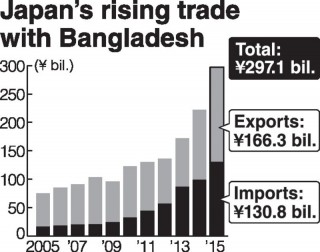Loading
Search
▼ Japan’s Economic Relations With Bangladesh Deepening
- Category:Other
Economic relations between Bangladesh, whose capital Dhaka was the site of a recent terrorist attack, and Japan have been rapidly deepening. An increasing number of Japanese companies choose the country rather than China as a production base due to its low labor costs.
Because Bangladesh’s economy has continued to have high growth, Japanese companies are hopeful about not only the country’s demands for infrastructure, but also it being an attractive consumer market in the near future.
If this terrorist attack raises the risk sentiment about the country’s security conditions, it is feared that the business activities of about 240 Japanese companies operating in Bangladesh may be negatively impacted.
Bangladesh’s real gross domestic product growth rate has been at least 6 percent since 2011. According to the World Bank, Bangladesh’s GDP growth rate in 2016 will likely be 6.3 percent.
Demands for power generation plants, railways, bridges and other infrastructure in the country have been rapidly growing.
In a five-year period through fiscal 2014, Japan offered a total of ¥1.6 trillion of assistance for the country’s development.
According to the Finance Ministry’s trade statistics, the total trade value between the two countries in 2015 amounted to ¥297.1 billion. The figure increased 34 percent from the previous year.
Exports from Japan amounted to ¥166.3 billion. In addition to steel and machinery for manufacturing plants, exports of automobiles and other consumer products have been increasing.
Japan’s import value from Bangladesh amounted to ¥130.8 billion. Many of the goods are clothing and textiles produced for the Japanese market.
According to the Japan External Trade Organization (JETRO), among the Japanese companies operating in the country, about 80 percent are small and midsize companies that mainly produce screws, rubber and plastic parts.
Because Bangladesh’s economy has continued to have high growth, Japanese companies are hopeful about not only the country’s demands for infrastructure, but also it being an attractive consumer market in the near future.
If this terrorist attack raises the risk sentiment about the country’s security conditions, it is feared that the business activities of about 240 Japanese companies operating in Bangladesh may be negatively impacted.
Bangladesh’s real gross domestic product growth rate has been at least 6 percent since 2011. According to the World Bank, Bangladesh’s GDP growth rate in 2016 will likely be 6.3 percent.
Demands for power generation plants, railways, bridges and other infrastructure in the country have been rapidly growing.
In a five-year period through fiscal 2014, Japan offered a total of ¥1.6 trillion of assistance for the country’s development.
According to the Finance Ministry’s trade statistics, the total trade value between the two countries in 2015 amounted to ¥297.1 billion. The figure increased 34 percent from the previous year.
Exports from Japan amounted to ¥166.3 billion. In addition to steel and machinery for manufacturing plants, exports of automobiles and other consumer products have been increasing.
Japan’s import value from Bangladesh amounted to ¥130.8 billion. Many of the goods are clothing and textiles produced for the Japanese market.
According to the Japan External Trade Organization (JETRO), among the Japanese companies operating in the country, about 80 percent are small and midsize companies that mainly produce screws, rubber and plastic parts.
The country’s population is about 160 million and wage levels of plant workers are said to be about one-fourth of those in China. In many cases, Japanese companies that had produced textile and apparel products in China increased or shifted their production bases to Bangladesh.
Fast Retailing Co., which operates the Uniqlo clothing store chain, has produced goods in plants on consignment in Bangladesh since 2008.
The company opened a store in Dhaka in 2013 and the number of its stores in the country has reached nine.
In this terrorist attack, Fast Retailing confirmed that all of its employees in the country were safe. One of the stores close to the site of the incident suspended operations temporarily.
Ajinomoto Co. established its local unit in Dhaka in 2011, in which two Japanese employees are stationed. Though about 60 employees work in the local unit’s factories, such as one for packaging Ajinomoto-brand seasoning, the company said, “We have not received a report that any of our employees are victims.”
A consortium in which Japanese general contractors, including Obayashi Corp. and Shimizu Corp., take part, has built and repaired bridges. After the terrorist attack, the consortium confirmed 25 workers in the construction projects were safe and instructed them to stand by at home.
Starting this year, Tokyu Construction Co. has engaged in a project in Dhaka related to construction of Bangladesh’s first express railway. A company spokesperson said, “We’ll judge how to respond while watching situations in the country.”
In the wake of the terrorist attack, an official of JETRO’s Dhaka office expressed concern: “It is possible that new investments from Japan will slow down from now on. We hope the incident will not adversely affect the good economic relations.”
The Yomiuri Shimbun
Fast Retailing Co., which operates the Uniqlo clothing store chain, has produced goods in plants on consignment in Bangladesh since 2008.
The company opened a store in Dhaka in 2013 and the number of its stores in the country has reached nine.
In this terrorist attack, Fast Retailing confirmed that all of its employees in the country were safe. One of the stores close to the site of the incident suspended operations temporarily.
Ajinomoto Co. established its local unit in Dhaka in 2011, in which two Japanese employees are stationed. Though about 60 employees work in the local unit’s factories, such as one for packaging Ajinomoto-brand seasoning, the company said, “We have not received a report that any of our employees are victims.”
A consortium in which Japanese general contractors, including Obayashi Corp. and Shimizu Corp., take part, has built and repaired bridges. After the terrorist attack, the consortium confirmed 25 workers in the construction projects were safe and instructed them to stand by at home.
Starting this year, Tokyu Construction Co. has engaged in a project in Dhaka related to construction of Bangladesh’s first express railway. A company spokesperson said, “We’ll judge how to respond while watching situations in the country.”
In the wake of the terrorist attack, an official of JETRO’s Dhaka office expressed concern: “It is possible that new investments from Japan will slow down from now on. We hope the incident will not adversely affect the good economic relations.”
The Yomiuri Shimbun
- July 4, 2016
- Comment (0)
- Trackback(0)



